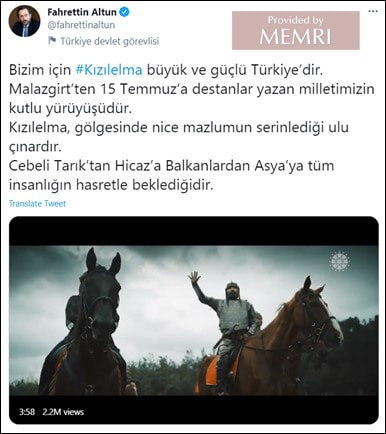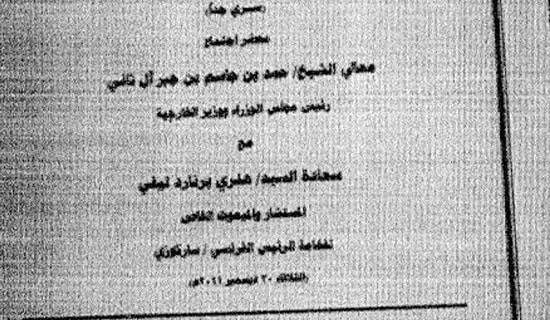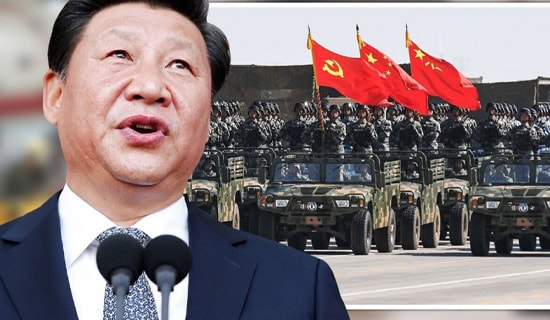In January 20, 2021 article titled "The 'Red Apple' And The Plan Followed By Turkey; The Eurasian Dream of Erdoğan," in the media outlet Iranian Diplomacy, Iranian expert Shohreh Poulab argued that the concept of Kızıl Elma (Turkish for "Red Apple"), "in Turkish mythology represents the final aim of dominance, is the symbol of the Pan-Turkic movement with its main objective being the unification of all Turkic people to gain world superiority."

(Source: Facebook.com)
In her article, Poulab stressed that "the geography" that is embedded in the concept of the "Red Apple" is a large swath of land from Southern Europe to Central Asia where Turkey, under the leadership of Erdoğan, applies an active foreign policy. Poulab added that from a political standpoint, Erdoğan's "Red Apple" project gives a new version of a geopolitical rivalry with China and Russia in Central Asia in the form of a "balance of power policy." She also stated that Erdoğan's plan is to change the existing geopolitics of Eurasia and become a global power.

Shohreh Poulab (source: Irdiplomacy.ir)
The tension in Iran-Turkey relations has recently been expressed in the Iranian media. The Iranian regime is alarmed by the expansionist actions of Erdoğan's Sunni Islamist government, which come at the expense of Shi'ite Islamist Iran and its resistance axis.[1]
Following is Poulab's article, published in Iranian Diplomacy, an Iranian news analysis and political commentary website dedicated to Iranian foreign policy:[2]
"The Geography Embodied In The Concept Of 'Red Apple' Refers To A Wide Area From Southern Europe To Central Asia"
"Recep Tayyip Erdoğan, the President of Turkey, on August 26, 2020, on the occasion of the anniversary of the victory of the Seljuk dynasty over the army of the Byzantine Empire in the Battle of Manzikert, stated that Turkey 'will get what is rightfully its in the Mediterranean, the Aegean and the Black Sea.' In this speech, Erdoğan, responding to the joint military drill of Greece, France, Italy and Cyprus near the Greek island of Crete in the south of Cyprus, warned that 'we will never make any concessions on what belongs to us... we urge our counterparts to pull themselves together and avoid mistakes that would lead to their devastation.'[3]
"The aggressive speech of Erdoğan at this event, along with the nationalistic enthusiasm resulting from the history of the Ottoman Empire, is further proof of Erdoğan's strong belief in his expansionist foreign policy. At the same time that he was making this war-mongering speech, Erdoğan mentioned the 'Red Apple' in his tweets, which is the symbol of legendary foundation of the Turkish dominance in Central Asia and represents the most important symbol of Turkish nationalism and expansionism.
"The term 'Red Apple' ('Kızıl Elma'), which in Turkish mythology represents the final aim of dominance, is the symbol of the Pan-Turkic movement that aims to unite all the Turks in the four corners of the globe to gain global supremacy. This concept is the core of the expansionist approach of Turkey. As Fahrettin Altun, the Head of Media and Communications in the office of President of Turkey, declared: the 'Red Apple' to us represents a great and powerful Turkey and is the symbol of the sacred progress of our nation in the historic march from [Battle of] Manzikert in 1071 to the 15th of July (the failed coup of 2016). The 'Red Apple' is like a huge tree that provides shade from Gibraltar to Hedjaz and from the Balkans to Asia.[4] The point is that the Seljuqs, who are the predecessors of the Ottomans, in 1071 defeated the predominantly Greek forces of the Byzantine Empire and opened the gates of Anatolia to the Turks. In Turkey, this victory is cited as the onset of the gradual Turkification of Anatolia.
"The geography embodied in the concept of 'Red Apple' refers to a wide area from southern Europe to Central Asia, in which Turkey pursues an active foreign policy under Erdoğan. Turkey seems to have maintained its independent position in the Mediterranean region by engaging directly in the Libyan political process, preserving the sovereignty of Turkey and the Turkish Cypriots in the Eastern Mediterranean. By setting a new agenda it manipulates geopolitics in Eurasia to achieve its policies throughout the region – based on the concept of the 'Red Apple,' from Andalusia in southern Spain to Bukhara in Uzbekistan.
SUPPORT OUR WORK

"Contemporary foreign policy based on pan-Islamism derived from Islamic identity along with the use of the re-model of civilization left over from the Ottoman Empire as neo-Ottomanism Combined with national security doctrines such as 'Blue Homeland' – in Turkish Mavi Vatan – will pave the way for strengthening the foundations of economic, military, and political power to continue Turkey's active role in the wider arena. Turkey demonstrated a wide range of claims from the Eastern Mediterranean, the Aegean and the Black Sea during the 'Blue Homeland' naval exercise from February 27 to March 8, 2019.
"Turkey, by filling the geopolitical vacuum in the Eastern Mediterranean, has demonstrated its resolute commitment to defend its maritime borders and its national sovereignty. And by intervening in the Nagorno-Karabakh conflict, in order to attain the security of the southern Caucasus and to open the gates from Anatolia towards Central Asia, has shown that [Turkey's] dream of Pan-Turkism and Turanism is achievable. These displays of Erdoğan's hard and aggressive power in the Middle East have calmed down as they enter Central Asia, and soft power through trade and investment has become Ankara's influential arms.

Fahrettin Altun tweeted: "For us, the Red Apple is a great and powerful Turkey. It is the blessed march of our nation, which has written legends from Manzikert to July 15, [2016, i.e., the attempted coup in Turkey]. The Red Apple is the great sycamore tree in the shade of which many oppressed [peoples] cool themselves. It is what all people from Gibraltar to the Hejaz, from the Balkans to Asia, await wishfully." (Source: Twitter.com/fahrettinaltun, August 24, 2020)[5]
"The Revival Of The Concept Of Pan-Turkic Solidarity Smoothed The Way For The Turkic Coalition In All Of Central Asia"
"Central Asia is vital to the global energy provision, especially for the security and stability of the Euro-Atlantic region, and is strategically important due to its energy resources. In addition to being the main hub for the oil and gas pipelines, this region is of geo-economic importance for providing trading routes and corridors. Hence, a stable and independent Central Asia is able to affect and attract international economic policies.
"Turkey is the first country to have officially recognized the countries of Central Asia, and has sought to use common historical, linguistic and cultural bonds with the region to increase its trading and commercial activities. Turkey and the Central Asian countries are part of a larger group which share the same Turkish ancestry, ethnicity and language which stretches from the Mediterranean to Siberia. The revival of the concept of Pan-Turkic solidarity smoothed the way for the Turkic coalition in all of Central Asia and the Caucasus and the creation of the Turkic Council, or the 'Cooperation Council of the Turkic-Speaking States,' which was established in October of 2009 among Turkey, Republic of Azerbaijan, Kazakhstan, and Kyrgyzstan for the aim strengthening the cooperation among member states in various fields. Through the 'Cooperation Council of the Turkic-Speaking States,' Turkey attempts to develop strong and powerful ties with its peripheral states. The influence of Ankara in Central Asia and the Caucasus causes that all members of the Council to benefit from the vast array of Turkish culture and history.
"From a trading and economic standpoint, Turkey is the most direct trading route between Central Asia and the European countries; and, on the other hand, Central Asia and the Caucasus present the most direct trading route between Turkey and the Far East Asian countries, China and Japan. The strategic location of the Caucasus means that the route of influence of Turkey over all of Central Asia passes through the Caucasus and becomes the most important gateway for Turkey to increase its economic and commercial relations with the Central Asian republics. The presence of vast energy reserves in Central Asia and the Caspian Sea region and the transportation of those resources through the Caucasus to the global markets, has made the Turkish strategic vision of building the Baku-Tbilisi-Ceyhan pipeline obvious and in this manner justifies Ankara's intervention in the 44-day Nagorno-Karabakh conflict in October of 2020.
"Politically, Erdoğan's 'Red Apple' project provides a new version of geopolitical rivalry with China and Russia in Central Asia in the form of a 'balance of power policy.' Turkey, by recognizing the hegemonic role of Russia in Central Asia and being aware of the eagerness of Kremlin to assimilate the republics that split from the Soviet Union that are included in the Eurasian Economic Union (EEU), has chosen to cooperate with Moscow. The ability of Moscow and Ankara to overcome the November 2015 crisis and the downing of the SU-24 Russian fighter jet was the onset of the rapprochement between the two countries and strengthened their cooperation. Thus, pursuing Turkey's defense cooperation program with Kazakhstan and Uzbekistan will not be a direct challenge to Russia. Signing the Turkey-Kazakhstan military cooperation agreement includes defense industry, joint maneuvers, intelligence systems and cyber defense, and Ankara’s crawling to Russia's periphery.

In a video commemorating medieval victory and showcasing modern Turkish military, Turkish President Erdoğan urges listeners 'to the Red Apple!' (source: Twitter.com/rterdogan, August 25, 2021)[6]
"China, Turkey's other rival in the region, with the Silk Road Economic Belt initiative, has been able to align Central Asia, Russia, Eastern and Central and Western Europe in one direction. From 2013, with the expansion of its global Belt and Road Initiative (BRI), [China] has been able to choose the shortest route to Europe through Central Asia. Turkey has welcomed Chinese economic growth in Eurasia and with its [Turkey's] Middle Corridor initiative which passes through Georgia, Azerbaijan and the Caspian Sea, has completed China's Silk Road Economic Belt Initiative. One of the benefits of Turkey's intervention in the Nagorno-Karabakh conflict was to gain access to the Eastern Caspian Sea region through Armenia to advance its own position and to become, in China's view, an important player in this corridor. In 2017 the railroad between Baku-Tbilisi-Kars, connecting Kazakhstan and Turkmenistan to areas beyond the Caucasus, became operational, and it also played an important role in the Middle Corridor project.
"Ankara's goal is to establish relations with Central Asian countries based on cultural codes based on historical ties in order to penetrate a new geopolitical axis in the heart of Eurasia. Turkish families in the five republics of Azerbaijan, Kazakhstan, Kyrgyzstan, Turkmenistan and Uzbekistan, as well as Turkish minorities in the far east of Russia and western China, will constitute the infrastructure for this influence.
"In general, in order to increase Turkey's geopolitical stature, Erdoğan has on one hand used hard power and, by investing in military capacities, has exerted control over the land borders in Syria, the Caucasus, and the maritime borders of Cyprus and Greece. On the other hand, through the use of soft power in the form of a modern outward looking vision under the guise of commonality of religion and language, as well as trade, [Erdoğan] plans to change the existing geopolitics of Eurasia. Erdoğan's statement that 'within half a century, Turkey will emerge as one of the strongest powers of the world, sailing into larger accomplishments,'[7] is an indication of his Eurasian dream."
[1] See MEMRI Special Dispatch No. 9185, Iranian Academic Rohollah Eslami: 'Turkey Pursues Its Racist Foreign Policy In The Context Of Its Expansionist Behavior'; To Counter The Threat, The Iranian Government Must Prioritize The 'Idea Of Iran' And Its National Interest, February 18, 2021; MEMRI Special Dispatch No. 9111, Iranian Expert Sadeq Maleki: 'The Old Ottomanism Was Looking To Expand To The Gates Of Vienna And To The West, [Erdoğan's] Neo-Ottomanism Has Its View Toward The East,' December 29, 2020; MEMRI Special Dispatch No. 9105, IRGC-Affiliated Javan Daily: Erdoğan 'Is In Pursuit Of Creating His Delusional State,' His 'Imaginary New Ottoman Empire,' December 23, 2020; MEMRI Special Dispatch No. 9065, Anti-Turkish Statements In Iran – Part I: Iranian Daily: Erdogan Is Pursuing A Policy Of Religious, Ideological War, Hiding His Hostile Regional Policy Behind An Islamic Mask, December 2, 2020; MEMRI Special Dispatch No. 9078, Anti-Turkish Statements In Iran – Part II: Iranian Daily On 'Sultan Recep [Tayyip Erdogan],' Who 'Fantasizes That He Is The Equal Of The Ottoman Sultans And Can Tell The World What To Do,' December 9, 2020; MEMRI Inquiry & Analysis Series No. 1546, Anti-Turkey Statements In Iran – Part III: Erdoğan Is Undermining Iran's Territorial Integrity, January 11, 2021; MEMRI TV clip No. 8530,Turkish President Recep Tayyip Erdoğan In A Parade In Baku, Azerbaijan: We Are Two States, But One Nation; We Must Hold Accountable Those Who Violated The Honor Of Humanity In The Nagorno-Karabakh War, December 10, 2020.
[2] http://irdiplomacy.ir/fa/news/1999549/%D8%B1%D9%88%DB%8C%D8%A7%DB%8C-%D8%A7%D9%88%D8%B1%D8%A7%D8%B3%DB%8C%D8%A7%DB%8C%DB%8C-%D8%A7%D8%B1%D8%AF%D9%88%D8%BA%D8%A7%D9%86, January 20, 2021.
[3] On August 26, 2020, speaking at the 949th anniversary commemorations of the Victory of Manzikert, President Erdoğan said: "That those, who were forced to leave Anatolia in a miserable condition just a century ago, now pursue hollow bravado in the Aegean is nothing but a manifestation of the psychology of whistling past the graveyard." He continued as follows: "There is no use fearing the inevitable. Turkey will get what is rightfully its in the Mediterranean, the Aegean and the Black Sea. Just as we do not have our eye on anyone’s lands, sovereignty or interests, we will never make any concessions on what belongs to us, either. To this end, we are determined to do whatever it takes in political, economic and military terms. We urge our counterparts to pull themselves together and avoid mistakes that would lead to their devastation. We want all to see that Turkey is no longer a country whose patience, resolution, capabilities or courage can be tested. If we say we will do it, we will do it and pay the price." https://www.tccb.gov.tr/en/news/542/121919/-we-want-all-to-see-that-turkey-is-no-longer-a-country-whose-patience-resolution-capabilities-or-courage-can-be-tested-, August 26, 2020.
[4] It is worth noting that on August 24, 2020, in honor of the 949th anniversary on August 26 of the 1071 Battle of Manzikert, Turkey released a music video titled the "Red Apple March." Seeking to present the modern Turkish military as the heir to the militaries of Turkish states stretching back 1,000 years, including the Ottoman empire and the Seljuks, the clip cuts between images of the Turkish military, including special forces, tanks, fighter jets, attack helicopters, rockets, naval vessels, and images of men in Ottoman and Seljuk military garb.
Upon the release of the video, Fahrettin Altun, the Head of Media and Communications in the office of the President of Turkey, tweeted: "For us, the Red Apple is a great and powerful Turkey. It is the blessed march of our nation, which has written legends from Manzikert to July 15, [2016, i.e., the attempted coup in Turkey]. The Red Apple is the great sycamore tree in the shade of which many oppressed [peoples] cool themselves. It is what all people from Gibraltar to the Hijaz, from the Balkans to Asia, await wishfully."
Commenting on Altun's tweet, Poulab commented: "The point is that the Seljuqs, who are the ancestors of the Ottomans, in 1071 defeated the mainly Greek forces of the Byzantine Empire and opened the gates of Anatolia to the Turks. In Turkey, this victory is cited as the onset of the gradual evolution of Anatolia to become part of Turkey." See MEMRI TV Clip No. 8240, Turkish Government Music Video Presents Turkish Military, Erdoğan As Heir To Ottoman, Seljuk Dynasties, Portrays Turkish Conquerors Praying In Hagia Sophia Mosque, August 24, 2020.
[5] See MEMRI TV Clip No. 8240, Turkish Government Music Video Presents Turkish Military, Erdoğan As Heir To Ottoman, Seljuk Dynasties, Portrays Turkish Conquerors Praying In Hagia Sophia Mosque, August 24, 2020.
[6] On August 25, 2020, the official Facebook account of Turkish President Recep Tayyip Erdoğan posted a video marking the 949th anniversary of the Battle of Manzikert. In the video, President Erdoğan recites a verse from a poem by Niyazi Yıldırım Gençosmanoğlu that urges the reader "to the Red Apple!" Kızıl Elma ("Red Apple") is a concept from Turkish mythology that has been used to refer sometimes to world domination and at other times to a particular military goal by a Turkish state that, once achieved, is replaced by some other goal, making the "Red Apple" ever elusive. The poem also refers to the mehter, the traditional Ottoman military band whose central wind instrument, the zurna, can be heard in the video, giving the music a distinctly "Ottoman" sound. The final line of the poem "Oh, Allah... In the name of Allah... Allah Akbar," is three simple Arabic prayers used in Turkish before beginning a task, in this case, pursuing the "Red Apple." In the video Erdoğan refers to the 1071 Battle of Manzikert as a gaza, or "a holy battle against non-Muslims for the purpose of protecting or propagating Islam." At the battle, Sultan Alp Arslan led a Seljuk army to victory over a Byzantine army on a field near the modern-day town of Malazgirt in Muş province, Turkey, opening the path for the Seljuk conquest of and migration into Asia Minor. The video shows horsemen in medieval military garb bearing the Seljuk standard cut with footage of the modern Turkish military, including soldiers on foot, fighter jets, attack helicopters, and the armed Turkish-made Akıncı drone. Recep Tayyip Erdoğan: "The brave ones will shed blood, the flag will begin to fade, and Anatolia will begin to be a homeland. To the Red Apple, to the Red Apple! Before playing the mehter, the best march. Oh Allah, in the name of Allah, Allah Akbar! "In the name of my nation, I remember with gratitude Sultan Alp Arslan and all the heroes who took part in this holy battle with him." See MEMRI TV Clip No. 8711, In Video Commemorating Medieval Victory And Showcasing Modern Turkish Military, Turkish President Erdoğan Urges Listeners 'To The Red Apple!', August 25, 2020.
[7] Sabah.com.tr/gundem/2019/08/26/baskan-erdogan-malazgirtte-konusuyor, August 26, 2019. See also MEMRI TV clip No. 8257, Turkish President Recep Tayyip Erdoğan: 'Our Civilization Is One Of Conquest'; Interlocutors Should 'Stay Away From Mistakes That Will Open The Way For Them To Be Destroyed,' August 26, 2020.




